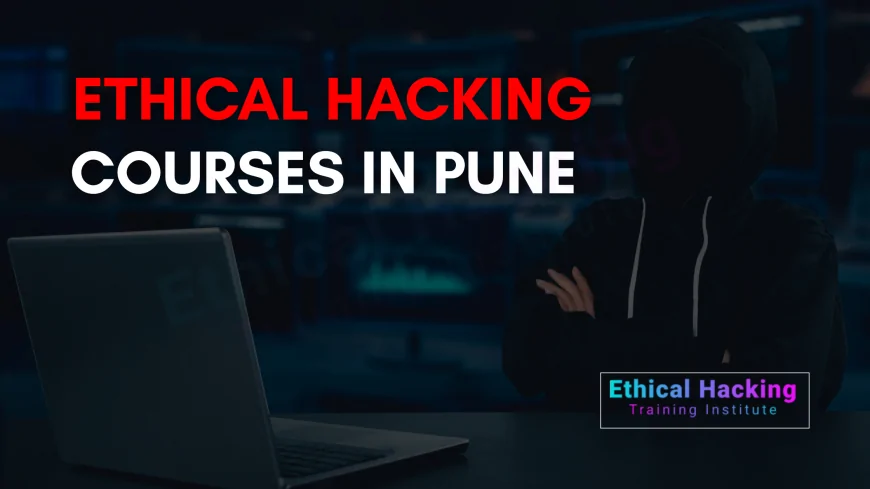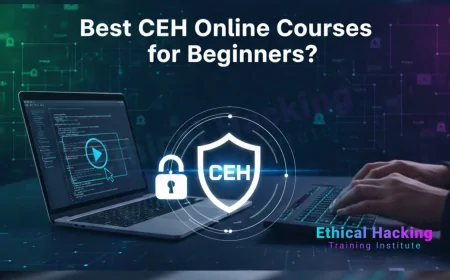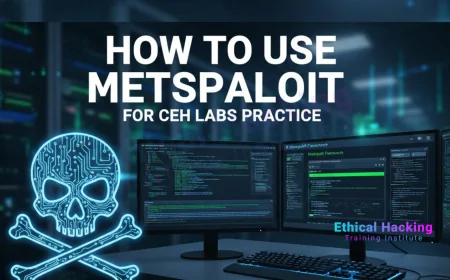Complete Guide to Ethical Hacking Courses in Pune | Syllabus, Career, & Certification
Explore the complete details of ethical hacking courses in Pune including syllabus, certifications, career opportunities, course formats, and practical training options. Start your journey into cybersecurity with the right skills and guidance.

In today's digital age, cybersecurity has become a paramount concern for individuals and organizations alike. With the increasing number of cyber threats, the demand for skilled ethical hackers is on the rise. Pune, known for its vibrant IT sector and educational institutions, offers a plethora of opportunities for aspiring ethical hackers. This blog delves into the comprehensive details of ethical hacking courses available in Pune, highlighting unique aspects to guide prospective learners.
Understanding Ethical Hacking
Ethical hacking involves authorized attempts to gain unauthorized access to a system, application, or data, mimicking the strategies of malicious hackers. The primary goal is to identify vulnerabilities and fix them before they can be exploited. Ethical hackers play a crucial role in strengthening an organization's security posture.
Why Choose Pune for Ethical Hacking Courses?
1. Thriving IT Ecosystem
Pune houses numerous IT companies, ranging from startups to multinational corporations. This ecosystem provides ample opportunities for internships, live projects, and job placements in cybersecurity roles.
2. Educational Hub
Often referred to as the "Oxford of the East," Pune boasts a rich educational heritage. The city offers a conducive environment for learning, with access to libraries, tech communities, and seminars.
3. Community and Networking
Pune hosts various tech meetups, workshops, and conferences focused on cybersecurity. Engaging with these communities allows learners to network with professionals and stay updated with industry trends.
Course Structure and Curriculum
Ethical hacking courses in Pune are designed to cater to both beginners and professionals. Here's an overview of the typical course structure:
1. Foundational Modules
-
Introduction to Cybersecurity: Understanding the basics of information security, threat landscapes, and the importance of ethical hacking.
-
Networking Fundamentals: Learning about network protocols, IP addressing, and network devices.
2. Core Ethical Hacking Concepts
-
Footprinting and Reconnaissance: Techniques to gather information about targets.
-
Scanning Networks: Identifying live hosts, open ports, and services.
-
Enumeration: Extracting detailed information from systems.
-
System Hacking: Understanding methods to gain access to systems and maintain control.
3. Advanced Topics
-
Malware Threats: Studying different types of malware and their behaviors.
-
Sniffing and Social Engineering: Capturing data packets and manipulating individuals to gain confidential information.
-
Denial-of-Service Attacks: Understanding how to prevent and mitigate DoS attacks.
-
Session Hijacking and Evading IDS: Techniques to intercept sessions and bypass intrusion detection systems.
4. Specialized Areas
-
Web Application Hacking: Exploiting vulnerabilities in web applications.
-
Wireless Network Hacking: Attacking and securing wireless networks.
-
Cloud Security: Securing cloud infrastructures and services.
-
Cryptography: Understanding encryption and decryption methods.
5. Practical Labs and Projects
Hands-on experience is a cornerstone of ethical hacking courses. Students engage in simulated environments to practice penetration testing, vulnerability assessments, and incident response.
Course Duration and Modes
1. Duration
Courses typically range from 40 to 90 hours, spread over weeks or months, depending on the intensity and depth of the curriculum.
2. Learning Modes
-
Classroom Training: Traditional face-to-face sessions with instructors.
-
Online Live Training: Interactive sessions conducted over the internet.
-
Self-Paced Learning: Pre-recorded lectures and materials for flexible learning.
Eligibility and Prerequisites
Ethical hacking courses in Pune are designed for a diverse audience:
-
Beginners: Individuals with basic computer knowledge.
-
IT Professionals: Network administrators, system analysts, and software developers seeking to enhance their cybersecurity skills.
-
Students: Undergraduates or graduates aiming for a career in cybersecurity.
While prior knowledge of networking and operating systems is beneficial, it's not mandatory for enrollment.
Tools and Technologies Covered
Students are introduced to a variety of tools used by ethical hackers:
-
Kali Linux: A Linux distribution tailored for penetration testing.
-
Nmap: Network scanning tool.
-
Wireshark: Network protocol analyzer.
-
Metasploit Framework: Penetration testing platform.
-
Burp Suite: Web vulnerability scanner.
-
John the Ripper: Password cracking tool.
Certification and Assessment
Upon course completion, students often receive a certificate of completion. Additionally, many courses prepare students for globally recognized certifications such as:
-
Certified Ethical Hacker (CEH)
-
CompTIA Security+
-
Offensive Security Certified Professional (OSCP)
These certifications enhance employability and validate the holder's skills in ethical hacking.
Career Opportunities Post-Course
Completing an ethical hacking course opens doors to various roles:
-
Ethical Hacker: Conducting penetration tests and vulnerability assessments.
-
Security Analyst: Monitoring and analyzing security systems.
-
Network Security Engineer: Designing and implementing secure network solutions.
-
Incident Responder: Addressing and managing security breaches.
-
Security Consultant: Advising organizations on best security practices.
The demand for cybersecurity professionals is growing, with competitive salaries and opportunities in various sectors.
Unique Aspects of Ethical Hacking Courses in Pune
1. Emphasis on Practical Learning
Courses prioritize hands-on experience, ensuring students can apply theoretical knowledge to real-world scenarios.
2. Industry-Relevant Curriculum
The curriculum is regularly updated to reflect the latest threats and security technologies, aligning with industry standards.
3. Access to Cybersecurity Communities
Students can engage with local cybersecurity communities, attend workshops, and participate in hackathons to enhance their skills.
4. Flexible Learning Options
With various modes of learning available, students can choose schedules that fit their personal and professional commitments.
FAQ's
1. What is the scope of ethical hacking courses in Pune?
Ethical hacking courses in Pune offer a growing career scope due to the city’s expanding IT and cybersecurity sectors. With increasing digital threats, professionals with ethical hacking skills are in high demand across finance, tech, and government domains. These courses prepare learners for roles in cyber defense and penetration testing.
2. Who can enroll in ethical hacking training programs in Pune?
Anyone with basic computer knowledge can enroll. These courses are ideal for students, IT professionals, and aspiring cybersecurity experts. Prior knowledge of networking is helpful but not mandatory, as most programs begin with foundational modules to build the required skills.
3. What topics are covered in ethical hacking courses in Pune?
Courses typically include topics like networking basics, footprinting, reconnaissance, system hacking, malware threats, social engineering, web app vulnerabilities, wireless security, cryptography, and cloud security. Training emphasizes hands-on learning through labs and real-world simulations.
4. How long does it take to complete an ethical hacking course in Pune?
The duration ranges from 40 to 90 hours depending on the depth and delivery mode. Full-time courses may span 1–2 months, while part-time and weekend options allow flexibility for working professionals and students.
5. Are part-time ethical hacking courses available in Pune?
Yes, many ethical hacking training institutes in Pune offer part-time and weekend courses. These are ideal for college students and working professionals who want to upskill without disrupting their current commitments.
6. Is a background in IT necessary for joining an ethical hacking course?
While having an IT background helps, it’s not mandatory. Most courses start with fundamental concepts in networking and system operations to help beginners quickly gain the necessary knowledge to proceed into more advanced topics.
7. What certifications can I pursue after completing ethical hacking training in Pune?
After training, learners are typically prepared for global certifications like CEH (Certified Ethical Hacker), CompTIA Security+, and OSCP (Offensive Security Certified Professional). These credentials boost career prospects and validate your cybersecurity skills.
8. What is the career benefit of learning ethical hacking in Pune?
Ethical hacking courses in Pune can lead to roles like security analyst, penetration tester, SOC analyst, and cybersecurity consultant. With the city's booming tech ecosystem, there are abundant job opportunities and higher-than-average salaries for certified professionals.
9. Do ethical hacking institutes in Pune offer practical training?
Yes, practical training is a core part of most ethical hacking programs. Learners engage in real-world simulations, vulnerability assessments, penetration testing, and live labs to apply what they learn in a hands-on environment.
10. What tools are taught in ethical hacking courses in Pune?
Popular tools include Kali Linux, Wireshark, Nmap, Metasploit, Burp Suite, and John the Ripper. These tools are industry-standard and used by professionals for penetration testing and security auditing.
11. Are there any job placement opportunities after completing a course in Pune?
Many ethical hacking training centers in Pune offer job assistance services, resume-building support, and interview preparation. While placement guarantees vary, most reputed institutes help connect students with hiring partners and cybersecurity companies.
12. How do Pune-based ethical hacking courses compare with online courses?
Courses in Pune offer local advantages like physical labs, peer networking, live mentoring, and access to community events. These benefits are often superior to generic online courses, making in-person training a strong choice for serious learners.
13. Is CEH certification training available in Pune?
Yes, several ethical hacking courses in Pune are aligned with CEH exam objectives. These programs prepare you to pass the CEH certification by covering all required modules and offering simulated practice tests.
14. Are there ethical hacking courses for beginners in Pune?
Absolutely. Beginner-friendly courses start with basics like network fundamentals and security principles before progressing to ethical hacking techniques. These are suitable for students fresh out of school or college.
15. What are the eligibility criteria for ethical hacking diploma programs in Pune?
Eligibility often requires 10+2 or equivalent education. Some advanced programs may ask for basic knowledge of computers or networking. However, most beginner-friendly courses have no strict academic prerequisites.
16. Can I learn ethical hacking in Pune while studying or working full-time?
Yes, flexible part-time, weekend, and evening classes are widely available. These allow students and working professionals to learn without affecting their daily schedules. Self-paced online options are also offered.
17. How much does an ethical hacking course cost in Pune?
The cost varies based on course depth and duration, ranging from ₹10,000 to ₹50,000. Comprehensive programs with certifications, live labs, and placement assistance typically cost more but offer greater value for career growth.
18. What learning modes are available for ethical hacking in Pune?
Learning modes include classroom-based training, live instructor-led online sessions, hybrid models, and self-paced eLearning. You can choose the mode that fits your lifestyle and learning preferences.
19. Do ethical hacking courses in Pune include cloud and IoT security?
Many advanced ethical hacking courses in Pune now include modules on cloud security, IoT vulnerabilities, and mobile application testing, as these are crucial areas in the modern cyber threat landscape.
20. What job roles can I apply for after completing ethical hacking training in Pune?
Post-training, you can apply for roles such as ethical hacker, security analyst, network security engineer, SOC analyst, malware analyst, and penetration tester. These roles are available in IT firms, banks, defense sectors, and consulting companies.
Start Your Professional Hacking Career Today
Pune offers a conducive environment for aspiring ethical hackers, with comprehensive courses that blend theoretical knowledge and practical skills. Whether you're a beginner or an IT professional, enrolling in an ethical hacking course in Pune can be a significant step toward a rewarding career in cybersecurity.
What's Your Reaction?
 Like
0
Like
0
 Dislike
0
Dislike
0
 Love
0
Love
0
 Funny
0
Funny
0
 Angry
0
Angry
0
 Sad
0
Sad
0
 Wow
0
Wow
0

















